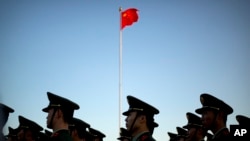Authorities in China announced this week that five officers are expected to be charged with dereliction of duty in the controversial and closely watched case of Lei Yang, a 29-year-old environmental scientist who died in police custody earlier this year. But a big concern for many in China is whether the trial will answer a host of questions in the mysterious case.
So far, very little information has been released about the yet to be indicted officers, four of whom have been released on bail. Their full names have not been released to the public and it is unclear how soon a trial could begin. Lawyers tell VOA that it may be a month before an indictment is made in the case.
News of Lei Yang’s death in police custody in May sparked a national outcry, with many voicing concerns online about police brutality and abuse of power. Given the circumstances of his death, the case had many asking online: “Who will be the next Lei Yang?”
And that’s why some are urging authorities to make all of the details of the trial open to the public: to ease concerns and prevent a similar tragedy from ever happening again.
Discussion censored
Authorities have promised an impartial investigation, but at the same time they have been working overtime to snuff out any discussion of the case. The public has been barred from commenting on the case on social media.
“Most of the questions that the public are interested in have not been released,” said Chen Guangwu, a rights lawyer. “The purpose of this is to limit public interest in the case and avoid any public opinions, which may taint the image of the nation’s judiciary agencies.”
Evidence loopholes
Police have said Lei Yang was picked up during a prostitution raid on a brothel fronting as a foot massage parlor. Shortly after that, he was taken to a nearby hospital and pronounced dead on arrival. His family said that Lei Yang, who had just become a new father two weeks before the incident, was on his way to the airport to pick up relatives.
Police have said that Lei Yang was resisting arrest. When his family was allowed to see his body, several hours after he died, his head and body were covered with bruises. Police prevented them from taking pictures of his body.
Piecing together what actually happened that night is likely to be difficult, notes Beijing University law professor Chen Yongsheng.
“Prosecutors did not open their investigation immediately after the incident, but instead it was handled by police and that could have an impact on the trial,” Chen said. “As far I understand, there are some questions that will be difficult to resolve. For example, it will be difficult to determine whether excessive force was used.”
Chen adds that evidence will also be limited as footage from CCTV cameras in the area where Lei Yang was arrested are no longer available and may have been destroyed by police.
Short arm of accountability
Even so, many will be looking for some clues to what happened. The problem of police and excessive force is not new in China and authorities have been working to reign in the problem of mistreatment and torture, making evidence obtained through such means inadmissible in court.
But the problem is still pervasive.
Police accountability is part of the problem, said Maya Wang, a researcher for Human Rights Watch in Hong Kong.
She said there is a trend in cases where mistreatment and torture was allegedly involved, that police enjoy almost complete impunity.
“In the cases in which they are punished, usually because the case have received a lot of public attention because the suspect died in police custody… then the officers, some of them, particularly the lower-level ones, get prison sentences,” Wang said. She adds that typically the punishment is on the lower end of the sentencing range.
Last year, Human Rights Watch released a report on police treatment of criminal suspects in China. The group found that in the first few months of 2014, there were 432 cases out of 158,000 where allegations of torture were referenced. But of those cases, only 23 resulted in evidence being thrown out by the court.
Lawyers said that if found guilty, the policemen could face up to three-years in jail.




